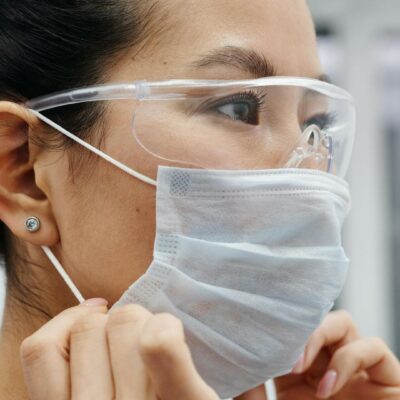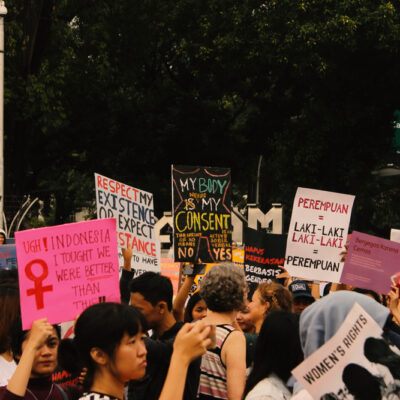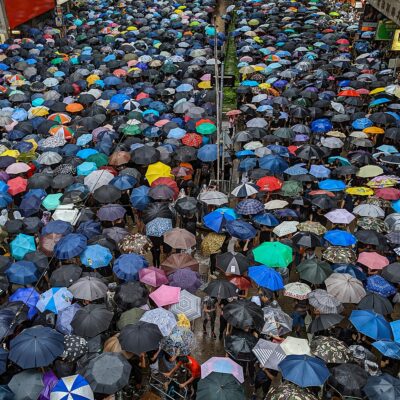Much analysis suggests that the impacts of the COVID-19 pandemic are disproportionately being felt by women and girls, especially those who hold insecure jobs or live close to poverty.
The following insights on how COVID-19 is affecting women in Indonesia are provided by Atnike Nova Sigiro, the Editor in Chief of Jurnal Perempuan, an Indonesian interdisciplinary journal circulating original ideas in gender studies. She spoke with MAR’s Managing Editor Cathy Harper.
What impact will the COVID-19 crisis have on your work in achieving gender equality?
It will be more challenging to continue our work when public concerns are so focused on coronavirus. There are many other problems that continue to happen, but people tend to think they are not important issues in the current crisis—like what we are doing in advocating for a draft law on sexual violence.
We have been involved in promoting and producing knowledge on the need for a draft law on sexual violence in Indonesia. Although Indonesia’s criminal code has included certain crimes such as rape, the scope is too narrow and there is an insufficient definition of what conduct constitutes sexual violence. The existing law also lacks a definitive approach to victims of sexual violence, such as preventing further trauma in the handling of victims of sexual violence, and rehabilitation and reparation for the victims. We published an edition of Jurnal Perempuan to advocate the enactment of the anti-sexual violence draft bill, and also joined campaigns with the women’s movement in Indonesia. The anti-sexual violence draft law was included in the legislative priorities for the parliament term of 2014-2019, but by the end of the last parliament’s term it was not completed—they could not even come up with the title of the draft law. So in terms of the legislating process in 2019-2024 the draft law will be treated as if nothing was accomplished. If this draft continues to be discussed in the current parliament’s term, I worry that lobbying will have to start from zero, although the public knowledge may still be there.
The Government’s focus on sexual violence against women during this pandemic seems to be marginal. Women’s organisations who do legal aid continue to receive reports on high numbers of sexual violence and domestic violence during the pandemic, but they are not receiving extra support during COVID-19. When we [Jurnal Perempuan] have to do research on women’s issues we are not sure whether people give sufficient support to this issue compare with COVID-19 related issues. So I would say the pandemic creates more challenges for people working in women’s activism.
What are the most significant impacts on women and girls in Indonesia from COVID19 so far and why?
Increased domestic violence is a big problem, which has been exacerbated by COVID-19 in Indonesia and around the world.
The economic impacts are also significant, both on the income of women and on the share of unpaid domestic work they are expected to do. The women particularly affected are those from lower socio-economic classes who mainly work in informal sectors and whose incomes are irregular.
Government measures to combat COVID-19 such as physical distancing, working from home, and the closure of shops and other businesses means that huge numbers of Indonesian women can’t continue to work. The restrictions have especially affected women who work as street food traders, tailors, hairdressers, in school canteens and cleaners.
Unfortunately, there are no official figures available on how many women have lost their income due to COVID-19, but the majority of Indonesian workers are in informal and in precarious forms of work. Official figures from BPS (Badan Pusat Statistik, the Central Statistics Agency) indicate that more than half the Indonesian workforce is in the informal sector. The latest figures from the International Labour Organisation are much higher, indicating that about 85% of total employment in Indonesia is informal. This is common in the Asia-Pacific.
A significant issue for Indonesian women is that physical distancing policies have increased domestic work for mothers who, aside from regular household chores, must also handle home education for children since schools are closed and learning is occurring online from home. Women also disproportionately care for elderly and sick family members.
There are large numbers of women in this situation – that is, not in the paid workforce but doing more unpaid domestic work.
How has COVID-19 effected your own workplace?
We have been working from home for two months. Fortunately, most of our work is desk-based and we are still doing some research, but we cannot really expand our focus. Like many women we are dealing with children who need to continue their school from home and at the same time we need to do our daily paid work and housework. We are lucky to have time, technology, and money, but I think for other families who may not be as privileged and who have less digital access compared to us, COVID-19 has created a bigger burden for the mothers, the housewives and the children.
The situation will continue until the pandemic has ended. When it’s ended, I don’t think there will be any major change to traditional gender roles in households. For example, in social media and government campaigns and information there’s little attention on how to handle gender equality in housework.
What is the expectation in terms of lifting restrictions in Indonesia?
A lot depends on public behaviour during Idul Fitri. Many people have done their holiday shopping and have been buying gifts for children at shopping centres and markets, despite coronavirus. This year the government officially banned ‘mudik’ – where people travel to their home towns to celebrate. But many people are still travelling and will spend one or two weeks with family in their home compounds where there will be not much physical distancing. There might be a shocking impact and there could be further extension of social distancing rules.
Also, many families have critical issues they have to deal with, such as earning enough money to buy food. Not all families have decent houses to live healthily during coronavirus. Indonesia is different to Australia where there is the luxury of physical space.
What needs to be done by government, business and others?
It’s still unclear how the government will address massive unemployment and loss of families’ incomes. Indonesia is Southeast Asia’s biggest economy, but has so far not spent as much on economic stimulus as many of its neighbours. There will be greater pressure to open business and markets such as malls, marker, and offices—despite the existing pandemic.
Government initiatives focus more on safety nets such as direct cash transfers than jobs protection. In one of the policies to address unemployment, the government encourages the recipients of direct cash transfers to use the money provided for online training. However, given the situation I do not consider such training as a jobs protection policy. The risk of much higher unemployment should be carefully addressed by government and business sectors.
Medical services must be made more affordable and accessible. COVID-19 patients are given free treatment, but private hospitals can refuse to accept COVID-19 patients, so the community has to rely on government hospitals.
A government subsidy for domestic utilities such as electricity and water would help many households, especially those on very low incomes. Rental assistance, especially in big cities where the poor live in rented houses, would also help many vulnerable people.
What can be achieved by female leaders?
Examples of leadership at the elite level may exist in other countries, but the same does not apply to Indonesia. The adoption of a 30% quota for female candidates in elections has increased the number of women in parliament, both at the central level (House of Representatives/DPR) and at the regional level (Regional House of Representatives/DPRD). But at the decision-making level women remain under-represented in Indonesia’s parliament, its executive body—at all levels.
In addition, the issue of women’s representation in parliament is not only a matter of representation based on gender, but also of substantive representation where women’s political agendas can be voiced. At a national policy level,there is not much of a gender-based policy approach in addressing COVID-19. The government seems to be more concerned about the macro-economic impacts.
The Indonesian government has set up a task-force on COVID-19. It includes very few women. Sri Mulyani, the Minister of Finance sits as secretary of the task-force, but not as a director. In fact, she was removed from as a director of the task-force. The task-force consists of representatives of 19 ministerial offices, but a representative from the Ministry of Women Empowerment and Child Protection is not among them.
East Java has a female governor and is the only province to do so. Has there been any difference in response to COVID there?
I didn’t specifically follow her actions in handling coronavirus. I cannot really say whether she applied a different strategy such as gender sensitive approach in handling COVID-19.
The National Commission on Violence Against Women (Komnas Perempuan) is appreciated for highlighting women’s issues during COVID-19. Women’s leadership in the context of COVID-19 can also be observed at community level. Civil society organisations and women’s rights groups have been actively addressing COVID-19 in many ways, such as providing masks for women in prisons in Jakarta, providing meals for women traders in traditional markets who cannot work due to government lockdowns and collecting donations to support members of the transgender community in West Nusa Tenggara. Community initiatives led by women providing practical support such as providing food, medicine and other daily needs for those in their neighbourhoods must be praised.
Communities in general have taken their own resilient initiatives, but that’s not enough to address the long-term impact of COVID-19. The broader, long-term impact is yet to be seen and needs to be addressed further. Children who lose six months of learning, pregnant women who lose nutrition for months will experience long-term impact. But not much thought has yet been given to how the pandemic impacts socially and physically in the near term and the long-term future.
This interview has been edited for clarity and length. Image: Women in Jakarta. Credit: UN Women/Flickr.




